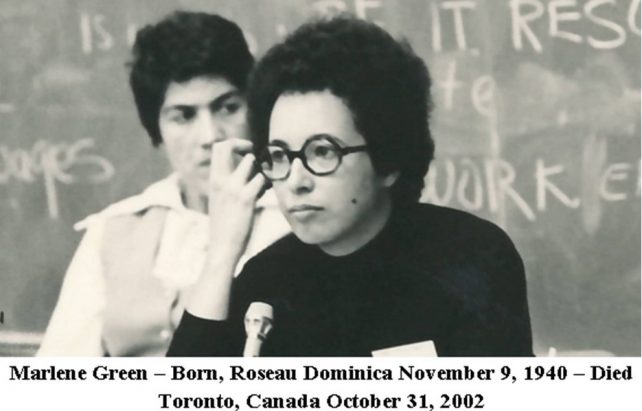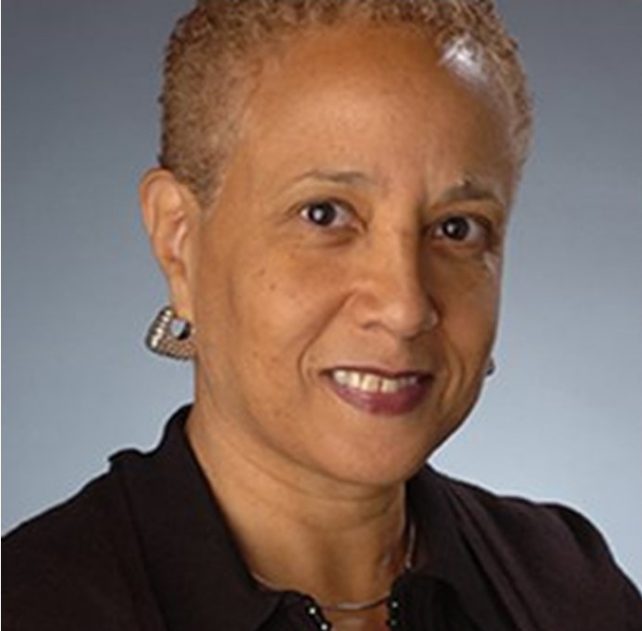
In 1972, when I entered the Dominica Grammar School, one of my most memorable teachers was Cecilia Green. Dominica’s Island Scholar of 1968, Cecilia Green was bright, kind, and gracious. She taught me social studies and awoke within me a commitment to transform society for the better. Little did I know that that Cecilia’s older sister Marlene Green was busy in Canada transforming that nation’s education system so that Black and indigenous Canadians could have better opportunities for progress.
Dr. Cecilia Green, following in the distinguished footsteps of her older sister Marlene, has blazed a trail in academia. Dr. Green is now a Professor of Sociology at the Maxwell School at Syracuse University New York.
Early Life on Dominica:
Marlene Green was born on November 9, 1940 in Roseau. She was the daughter of the part owner of the Dominica Dispensary, Louis Oliver Green and his wife Claron Green nee Royer of Vieille Case. Marlene was first of nine children. The others were Antonia “Tony” Green (now Bully), Paul Green, Peter Green, Lester Green, Ursula Green, Cecilia, Green, Joselyn Green and Mary Green.
According to her sister Antonia “Toni” Bully, nee Green, left Dominica for further studies in Canada in 1961. Marlene Green did her B.A. in English at the University of Toronto and her M.A. in English Literature at Windsor University. Toni, the wife of former Chief Agriculture Officer Collin Bully, stated:
It was Marlene and me in the early days. We were very close, and I was heartbroken when she left for Canada. Marlene loved people. No matter who it was Marlene would be there to help. At the Convent High School she was a dignified and proud leader. She was an achiever. Most importantly, she was sympathetic to the downtrodden. She was a very good person at heart.
Her brother Paul Green recalls:
Marlene was the brightest person I knew. She was kind and possessed strong leadership qualities. She would help me with my homework. On the weekends when we went to Greenhill Estate in the heights of Mahaut, she would often sit around the bonfire with the estate workers at night exchanging ideas. She was fond of the working people and communicated well with them and that is how she learnt to speak French patois. I remember Rosie and Mike Douglas from Portsmouth would visit with us at our home in the 1950s. They were friends of Marlene and later Marlene assisted Rosie in Canada. She later became Headgirl at the Convent High School then left for Canada.

Life in Canada:
Today, Marlene Green is recognized, alongside another Dominican called Rosie Douglas, as one of the most notable Blacks in Canadian history. When Marlene Green passed away on October 31, 2002, Dionne Brand, writing in NOW magazine in Toronto, Canada stated:
A city that has yet to come to terms with its black presence lost its most inspired social and political activist last Wednesday when Marlene Green died. Green’s life and work exemplified the very best in us. Her loss, if it can be greater, is all the more poignant given the current tenor of race relations. To paraphrase the poet Octavio Paz, we are “in a room abandoned by language.” Amidst the denial, the recrimination, the nihilistic war over and on black bodies, Marlene Green’s biography tell us her story as well as ours. She came here young [to Toronto] in the 60s from Dominica, in the eastern Caribbean, with all her gifts and her hopes for race and class justice.
Beginning with her founding of the Black Education Project in the late 60s, Green’s work became a lightning rod for black activism. Her organization was the nexus from which organizing emanated — advocacy and protests racism in schools, in policing, in the workplace and in civic life.
According to the Akua Benjamin History Project website at Canada’s Ryerson University:
Born in Dominica in 1940, Marlene Green came to Canada in the 1960s.
Spurred on by the concerns of Black parents about streaming in Toronto schools, high drop-out rates, and the lack of quality education to which Black children and youth had access, she founded the Black Education Project (BEP) in the late 1960s, the height of Caribbean immigration to Toronto. Among other things, the BEP provided tutoring to Black students and helped in their affirmation of their African heritage.
The Black Education Project became a hub for Black activism and several educational programs. BEP not only advocated for Black students, but it also provided after school programs, summer camps, and helped orient parents to the Toronto school system. BEP also organized protests racism in Toronto schools, in policing, and in the workplace.
In the 1970s, Marlene headed up the Brotherhood Community Centre Project, an organization that was being developed to address some of the challenges facing the Black community. The goal was to establish a physical community centre that would house many organizations to support the varied needs of African Canadians.
Marlene became a school/community relations officer at the Toronto Board of Education. There she co-wrote the first report on race relations in the education system. Through her work she supported the board’s examination of and response to the disproportionate educational outcomes for African Canadian students.
In the 1980s and 1990s, Marlene headed the Caribbean division of Canadian University Service Overseas (CUSO). CUSO is an organization that connects communities around the world with skilled Canadian to help end poverty and inequality. Established in 1961, CUSO International has deployed more than 15,000 volunteers and has worked in more than 100 countries on long-term development projects. At CUSO Marlen not only helped communities in the Caribbean, but she ventured to Africa. In particular, she worked in southern Africa assisting Southern African refugees who had fled the Apartheid regime. She supported the liberation of South Africa from Apartheid and befriend Nelson Mandela and the African National Congress leaders then engaged in that freedom struggle.
Dominican scientist Dr. Roy Mondesire recalls the leadership role of Marlene Green:
The Mondesire family and Green family were very close. We lived next to the Green’s Dominica Dispensary store, which was next to our own store, the Mondesire’s Super Service. Our store served food, alcohol and was also a min-mart. The Green’s were our best friends.
I spoke at Marlene’s funeral in Toronto. It was hard for me. But I wanted to speak of Marlene and her compassion. Her towering work as a towering social scientist. She was an exceptionally good person who sought to better humanity. It is very important to note that she was an organized, cerebral person. She organized our community via education for social progress.
She spoke to me about once going down the Zambezi River in a canoe during her time helping African liberation and development and how she was struck by a band of blue trees on the riverside. Trees are normally green. In a moment the trees turned green as the hundreds of blue birds that had covered the trees lifted into the air. She told me that amazing story of the tree scape changed by the presence of blue birds and I never forgot it. In a way it was a metaphor for her life. By her presence she changed things in an amazing way for the better.
On October 31, 2002 Marlene, surrounded by family and friends, died of breast cancer after a valiant struggle against that pernicious disease.
A short documentary film on Marlene Green by Ella Cooper of Anansi Studios can be found here: https://vimeo.com/182718454?ref=em-share
Marlene Green – Legacy:
Black Canadians have better opportunities in education today because of the work of Marlene Green and those who worked alongside her. Her work in Canada, the Caribbean and Africa helped to improve lives. Her towering presence on the world scene as an advocate of social change, via enhanced educational opportunities for the marginalized, is an example to all humanity. Yes, we are capable of inspired leadership where we put our time toward noble goals of nation building. Never let it be said that we let down our island home by selfishness, greed or misconduct at home or abroad.
Sadly, little attention is paid in Dominica to those champions of human progress such as Marlene Green who came from our small island. Small as Dominica is, we have produced human beings of sterling quality who have contributed much to betterment of the human condition. As a society, we elevate our self-worth when we embrace a civics curriculum in our schools which speak to the lives of our heroes and heroines. We need to learn of those whose work enhanced education, the pursuit of liberty and overall human progress on and off the island. By her noble efforts to eradicate racism in education and expand educational projects in Canada, Marlene bestowed a beneficial gloss on our nation and burnished the reputation of Dominicans in Canada and elsewhere. Let us follow in her worthy path.
We shall remember her.

Gabriel Christian as I said before thanks for this article on the life and works of Marlene Green
Never let it be said that we let down our island home by selfishness, greed or misconduct at home or abroad.
Wow very notable achievements, I had no idea of her. Good to know of those who contributed so valiantly to upliftment of black people in the diaspora. This is good reason why Dominica must introduce Black history, African studies to include our locals in our schools. Thanks for keeping the fire burning.
Wow. Impressive!